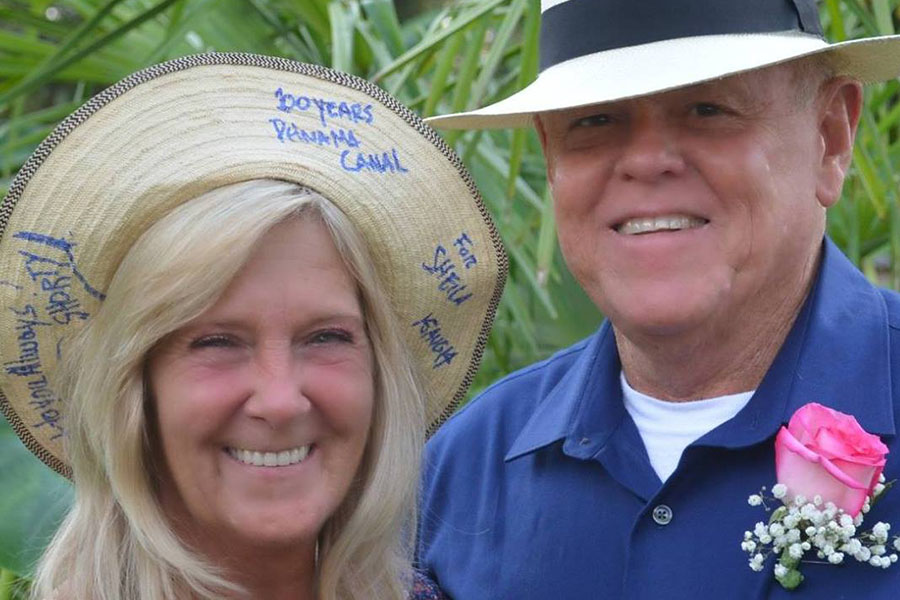
Allen Cotton: A 14-Year Pancreatic Cancer Survivor’s Story of Faith, Self-Advocacy & Overcoming the Odds
Upadted By Julia Brabant
December 2024
Diagnosed: February 16, 2010
Status: Still Cancer-Free
“When they sent me in for surgery, they told me I may not come back out.”
It’s a statement many pancreatic cancer patients have heard before, but that didn’t make it any easier for Allen Cotton to digest right before undergoing the Whipple procedure, one of the most technical and invasive surgical procedures out there.
The operation involves removing the head of the pancreas, a portion of the small intestine, the gallbladder and the bile duct, and it is common among patients who, like Allen, have received pancreatic cancer diagnoses. Allen’s diagnosis came as a complete surprise, and while no one would ever consider such a diagnosis a blessing, the fact that he was able to catch it and treat it early on wound up being exactly that.
No stranger to sinus infections, Allen had battled a pretty serious one every five years or so throughout his life. So, when his symptoms came back with a vengeance in 2010 and a severe, nagging cough came with them, he decided it was time to seek medical attention. His doctor in Alabama thought it might be bronchitis, but when Allen had a chest X-ray to rule out pneumonia, physicians identified spots on Allen’s lungs that warranted a cat scan.
A subsequent meeting with an oncologist revealed that what Allen had, in fact, was pancreatic cancer.
“Cancer is rampant in my family,” he said, noting that his diagnosis shouldn’t have come as a complete surprise given that his mother, father, sister and brother had all had various forms of the disease. “Still, though – you go in with a cold, and you come out with pancreatic cancer.”
Taking Control of Treatment
Things tend to move quickly after an advanced pancreatic cancer diagnosis, and Allen’s care team urged him to have a Whipple procedure without delay. Interestingly, Allen’s cousin also received a pancreatic cancer diagnosis right after Allen did, and he, too, underwent a successful Whipple procedure.
Once Allen found out he had to have the Whipple, he quickly became his own advocate, researching pancreatic cancer treatment facilities and specialists to get a better sense of his options. Ultimately, he decided to seek treatment at Johns Hopkins Hospital in Baltimore, Maryland, and when he got there, doctors had two critical health issues to address.
First, he had his swollen pancreas. Second, he had a large tumor on his left kidney that required a laparoscopic procedure. Wanting to condense his pain and suffering as much as possible, he urged doctors to move forward with both surgeries right away. Ultimately, they did just that, performing both the laparoscopic kidney procedure and the Whipple procedure within the same day.
“At this point, I told Jesus ‘It’s in your hands,” Allen said, reflecting on his final moments in his wheelchair as hospital staff wheeled him toward the operating room. “And at that moment, all my fear was gone.”
It wasn’t that he felt a warm hand or saw an immediate sign from above that things would end up OK – instead, it was like a sudden, inexplicable sense of calm and acceptance came over him, and all the fears he’d carried with him up until that point simply evaporated.
About five or six days after his procedures, Allen had weaned off the medications enough to understand his doctors when they told him they’d completely removed his cancer. Not only that, but he was the only patient on the entire pancreatic cancer floor they believed would survive.
“I’d started walking laps around Johns Hopkins as part of recovery – my sleep schedule was all messed up, so I’d do three or four laps late at night or early in the morning,” Allen said. “The night they told me that, I walked 75 laps.”
Adjusting to Life After Surgery
Now, 14 years after his initial diagnosis, Allen lives happily alongside his wife, Shelia, whom he credits as his strength. Their journey together began as they bonded over a shared loss, with each losing their respective spouses to cancer one year apart. After they began seeing one another, Allen proposed to Shelia on Valentine’s Day – only to receive his own cancer diagnosis two days later.
“I told her that if she didn’t want to go through this again, I didn’t blame her,” he said. “I said, ‘Just tell me, and we’ll be friends.’”
Shelia chose to stay by his side.
“You’re not getting rid of me that easily,” she’d told him, and the two have continued to face every challenge together in the days since.
“I think that helped me make it through,” Allen said, of Shelia’s support and commitment. “She also has a very strong faith, and my faith has gotten stronger because of it.”
While Allen has remained pancreatic cancer-free in the weeks, months and years since his 2010 procedures, he did receive a skin cancer diagnosis, leading to seven separate surgeries. He also received a late-in-life Type 1 diabetes diagnosis, which is common among those with pancreatic cancer and, in some cases, a precursor to a pancreatic cancer diagnosis.
Managing his diabetes is not an easy feat – Allen takes between four and five shots of insulin every day, taking them before meals, before bedtime and otherwise as necessary. He also sees a diabetes specialist quarterly to monitor his condition and adjust his treatment plan and wears something called a “Libre 3” to continuously monitor his glucose levels. The device alerts Allen if he needs to eat or take a dose to keep his glucose levels in check.
Enjoying Life on the Farm
Despite these ongoing health challenges, Allen and Shelia have found solace in their life together on a farm. After years of city living, the two, who retired within a few years of one another, took a cue from one of Shelia’s brothers, a North Carolina farm owner, and decided to purchase some farmland of their own. The farm, which serves as home for the pair, multiple horses and chickens, and the couple’s beloved Great Pyrenese, has since become something of a sanctuary for Allen and Shelia, enabling them to embrace a rewarding, yet peaceful, lifestyle surrounded by nature.
And while life has largely returned to the way it was before – both Allen and Shelia stay active doing everything from clearing trees to chasing grandkids – Allen does recognize his own limitations and takes time to rest accordingly.
Despite their idyllic farm life, Allen’s sense of community and service, which developed at a young age when he joined the military, also remains steady. After 41 years of service, Allen retired from the military, but he still felt the call to serve, volunteering with the FEMA-sponsored Community Emergency Reaction Team, the Sheriff’s Reserve and the County Volunteer Firefighters. A certified firefighter, Allen even secured a “County Firefighter of the Year” nod, but a back injury has since limited his physical involvement in volunteer efforts to some degree.
As someone who faced cancer and emerged on the other side, Allen feels extremely lucky to have a second chance at life, and this gratitude fuels his drive to give back to his community, share his own story with the members of his church and otherwise help those in need.
Allen also acknowledges the role a higher power might have played in his pancreatic cancer fight. For starters, he’d had that serendipitous experience on the way into his surgery. Then, he found out that his doctor in Alabama, a veteran-turned physician who had urged him to seek the answers that led to his early diagnosis, had previously been the sole survivor in a Vietnam ambush that claimed the lives of everyone else involved.
“Trust in God,” he said, offering up words of wisdom for others facing similar diagnoses. “A lot of prayers were said on my behalf. And don’t fool around – with pancreatic cancer, once it starts to present itself, it’s often too late. Do what you have to do to get rid of it as fast as you possibly can.”
Allen also stressed the power of staying active and encouraged anyone facing a new diagnosis to reject the common, but inaccurate, sentiment that it’s a death sentence. “Don’t give up; don’t let cancer win,” he said. “When you feel good, get up and move, and when you don’t feel good, get up and do all that you can. Attitude and Jesus will carry you through.”
He also urges candidates for the Whipple procedure to move forward with the surgery, but to do so with the understanding that life will look quite a bit different in the days that follow.
“Hopefully, they catch it early enough where surgery can get rid of it,” he said. “But be prepared for a rough first six months after the Whipple – it’s really, really rough.”
In Allen’s case, his care team had glued his incision after the procedure, rather than seal it with stiches, and the glue eventually gave out, leading his medical team to undo his stomach muscles, add in nine layers of pig skin and mesh, and then add metal stitches over the top that eventually required removal.
“You can do whatever you want now,” Allen recalls his doctor saying after stitching him back up. “You’re not coming undone again.”
Allen has done just that in the time since, whether that meant performing heavy lifting on the farm or taking down trees through his volunteer efforts. He notes that his experience with pancreatic cancer has given him a strong sense of gratitude and purpose, bringing to mind lyrics from “Why Me, Lord?” by Kris Kristofferson, a song that resonates deeply with Allen given his own cancer experience.
“There are certainly people more deserving than I,” Allen said, wondering why he was able to avoid the unfortunate fate many people face after a pancreatic cancer diagnosis. “The Good Lord is by my side – he just hasn’t revealed to me why just yet.”
Perhaps the answer lies in the lives Allen continues to touch through his service as a volunteer firefighter, his sharing of his own story at church and online, and his continued encouragement of others fighting cancer. While the reason may, as of yet, remain a mystery, Allen’s life continues to touch others, serving as a powerful reminder that faith, service and determination can transform uncertainty into triumph even in the face of one of life’s toughest challenges.
Allen continues to see his oncologist annually to monitor his condition and has remained free from pancreatic cancer since February 2010.



Awesome!